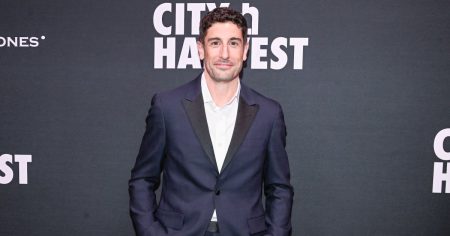Michelle Randolph, the actress portraying the controversial character Ainsley in the Paramount+ series Landman, acknowledges the polarized reactions to her portrayal of the 17-year-old daughter of a corporate fixer. The series, set in West Texas and brimming with high-stakes drama, features Billy Bob Thornton as the father and Jon Hamm as an oil tycoon. Several scenes involving Ainsley’s provocative conversations with her father about sex, often while clad in minimal clothing within the shared home, sparked widespread online discussions and viral attention. Randolph, however, emphasizes her commitment to portraying a fully realized, human version of Ainsley despite the character’s often shocking dialogue. She underlines the extensive preparation she undertook, including working with dialect, movement, and acting coaches, to understand and justify Ainsley’s actions, recognizing that such personalities, while unconventional, do exist. This dedicated preparation, spanning nearly a year, allowed her to immerse herself in the character and develop a deep understanding of Ainsley’s motivations.
Randolph’s approach to crafting Ainsley involved significant investment and careful consideration, particularly in light of the character’s potential for misinterpretation. She draws a comparison to her previous work on 1923, another Taylor Sheridan production, highlighting that Landman demanded significantly more preparation due to the complexities and nuances of Ainsley. The actress aimed to control her performance as much as possible to ensure a balanced portrayal, navigating the fine line between the character’s written depiction and her own artistic interpretation. The collaborative environment on set, including interactions with fellow actors Ali Larter, Billy Bob Thornton, and Jacob Lofland, further enriched her understanding of Ainsley. Immersing herself in the Texan setting also contributed to shaping the character’s free-spirited and untamed nature, qualities Randolph embraced and enjoyed portraying.
Addressing the negative feedback surrounding Ainsley, Randolph admits awareness but maintains a degree of detachment. She emphasizes the separation between her role as an actor, which concluded with the completion of filming, and the audience’s interpretation of the final product. While acknowledging the criticism, she finds solace in the fact that Ainsley sparks conversation and expresses pride in the overall show. She encourages viewers to offer Ainsley room for growth, emphasizing that the character’s current portrayal represents only a fraction of her personality. Randolph believes Ainsley possesses a deeper understanding of her actions than is initially apparent, showcasing a calculated approach to interacting with her parents. She highlights Ainsley’s love for her family and suggests that the character is in a process of self-discovery, influenced by her unique upbringing and interactions with her peers.
Randolph expands on the challenges of portraying a developing character, particularly in the initial episodes. She explains the difficulty of portraying early stages of a character’s arc without knowing their full trajectory, emphasizing the importance of gradual growth over the course of the series. The actress expresses gratitude for the opportunity to introduce Ainsley at an early stage of her development, anticipating further evolution and complexity as the story progresses. She reflects on her initial response to the script, describing a period of digestion before fully embodying the character. Once she understood Ainsley, the character’s actions felt consistent and unsurprising. Observing the audience’s reaction was intriguing, as she had already spent considerable time internalizing and understanding the character’s nuances. This prior understanding allowed her to approach the audience’s response with a degree of separation, recognizing their fresh perspective on a character she had already explored in depth.
The actress challenges the negativity directed at Ainsley’s comfort with her sexuality, arguing that such comfort should be celebrated as a form of authentic self-expression. She acknowledges Ainsley’s youth and anticipates the development of greater boundaries and understanding as the character matures. However, within the context of Ainsley’s upbringing and current environment, her behavior is presented as a natural consequence of her experiences. Randolph reiterates her pride in the show and her conscious decision to disassociate from audience reactions after completing her performance. This separation allows her to focus on the work she has done and anticipate future opportunities to develop the character further.
In conclusion, Michelle Randolph’s portrayal of Ainsley in Landman has sparked considerable discussion and controversy. The actress, however, stands by her performance, emphasizing the extensive preparation, thoughtful consideration, and artistic choices that shaped her portrayal. She recognizes the character’s complexities and unconventional behavior while advocating for a nuanced understanding of Ainsley’s motivations and developmental stage. Randolph invites viewers to witness Ainsley’s journey of self-discovery, promising further evolution and depth as the series unfolds. Despite the criticism, Randolph remains proud of her contribution to the show and confident in the integrity of her performance.








